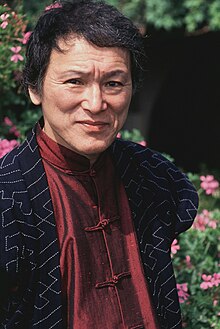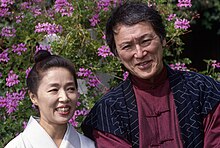Juzo Itami
Juzo Itami | |
|---|---|
伊丹 十三 | |
 Itami in 1992 | |
| Born | Yoshihiro Ikeuchi (池内 義弘) May 15, 1933 Kyoto, Japan |
| Died | December 20, 1997 (aged 64) Tokyo, Japan |
| Occupation(s) | Film director, screenwriter, actor |
| Years active | 1960–1997 |
| Spouse(s) | Kazuko Kawakita (1960–66) Nobuko Miyamoto (1969–1997) |
Juzo Itami (伊丹 十三, Itami Jūzō), born Yoshihiro Ikeuchi (池内 義弘, Ikeuchi Yoshihiro, May 15, 1933 – December 20, 1997), was a Japanese actor, screenwriter and film director. He directed eleven films (one short and ten features), all of which he wrote himself.
Early life
Itami was born Yoshihiro Ikeuchi in Kyoto.[1] The name Itami was passed on from his father, Mansaku Itami—who was a renowned satirist and film director before World War II.
At the end of the war, when he was in Kyoto, Itami was chosen as a prodigy and educated at Tokubetsu Kagaku Gakkyū (特別科学学級; "the special scientific education class") as a future scientist who was expected to defeat the Allied powers. Among his fellow students were the sons of Hideki Yukawa and Sin-Itiro Tomonaga. This class was abolished in March 1947.[citation needed]
He moved from Kyoto to Ehime Prefecture when he was a high school student. He attended the prestigious Matsuyama Higashi High School, where he was known for being able to read works by Arthur Rimbaud in French. But, due to his poor academic record, he had to remain in the same class for two years. It was here that he became acquainted with Kenzaburō Ōe, who later married his sister. When it turned out that he could not graduate from Matsuyama Higashi High School, he transferred to Matsuyama Minami High School, from which he graduated.[citation needed]
After failing the entrance exam for the College of Engineering at Osaka University, Itami worked at times as a commercial designer, a television reporter, a magazine editor, and an essayist.[citation needed]
Acting career

Itami studied acting at an acting school called Butai Geijutsu Gakuin in Tokyo. In January 1960 he joined Daiei Film and was given the stage name Itami Ichizō (伊丹 一三) by Masaichi Nagata. In May 1960, Itami married Kazuko Kawakita, the daughter of film producer Nagamasa Kawakita. He first acted on screen in Ginza no Dora-Neko (1960). In 1961 he left Daiei and started to appear in foreign-language films such as 55 Days at Peking. In 1965 he appeared in the big-budget Anglo-American film Lord Jim. In 1965 he published a book of essays which became a hit, Yoroppa Taikutsu Nikki ("Diary of boredom in Europe"). In 1966 he and Kazuko agreed to divorce.
In 1967, when working with Nagisa Oshima on a film Sing a Song of Sex (Nihon Shunka Kō) he met Nobuko Miyamoto. He and Miyamoto married in 1969. Around this time, he changed his stage name to "伊丹 十三" (Itami Jūzō) with the kanji "十" (ten) rather than "一" (one), and worked as a character actor in film and television.
In 1968 he played Saburo Ishihara, the father of Takeshi and Koji during season II, in the series for children Cometto-San. He became well-known for these series in most Spanish-speaking countries, along with Yumiko Kokonoe. who played Cometto-San.
In the 1970s, he joined the TV Man Union television production company and produced and presented documentaries for television, which influenced his later career as a film director. He also worked as a reporter for a TV programme called Afternoon Show.
In 1983, Itami played the father in Yoshimitsu Morita's The Family Game, and The Makioka Sisters for which roles he won the Yokohama Film Festival and Hochi Film Award for Best Supporting Actor.
Aside from the acting career, he translated several English books to Japanese, including Papa, You're Crazy by William Saroyan.
Itami was the brother-in-law of Kenzaburō Ōe and an uncle of Hikari Ōe.
Director
Itami's debut as director was the movie Osōshiki (The Funeral) in 1984, at the age of 50. This film proved popular in Japan and won many awards, including Japanese Academy Awards for Best Picture, Best Director, and Best Screenplay. However, it was his second movie, the 1985 "noodle western" Tampopo, that earned him international exposure and acclaim.[2]
His following film A Taxing Woman (1987) was again highly successful. It won six major Japanese Academy awards and spawned a sequel A Taxing Woman's Return in 1988. The central character, played by his wife Nobuko Miyamoto who appeared in all his films, became a pop culture heroine.[3] This was followed by his fifth film A-Ge-Man: Tales of a Golden Geisha.
Itami directed the anti-yakuza satire Minbō no Onna as his sixth feature. On May 22, 1992, six days after the release of the film, Itami was attacked, beaten, and slashed on the face by five members of the Goto-gumi, a Shizuoka-based yakuza clan, who were angry at Itami's film's portrayal of yakuza members.[4] This attack led to a government crackdown on the yakuza.[citation needed]
His subsequent stay in a hospital inspired his next film Daibyonin (1993), a grim satire on the Japanese health system.[citation needed] During a showing of this film in Japan, a cinema screen was slashed by a right-wing protester.[5]
He directed another three films before his death.
Death
Itami died on December 20, 1997[6] in Tokyo, after falling from the roof of the building where his office was located. On his desk was found a suicide note written on a word processor[7] stating that he had been falsely accused of an affair and was taking his life to clear his name. Two days later, a tabloid magazine published a report of such an affair.[8]
However, no one in Itami's family believed that he would have taken his life or that he would be mortally embarrassed by a real or alleged affair. In 2008, a former member of the Goto-gumi, a yakuza group, told a reporter, Jake Adelstein: "We set it up to stage his murder as a suicide. We dragged him up to the rooftop and put a gun in his face. We gave him a choice: jump and you might live or stay and we'll blow your face off. He jumped. He didn't live."[9][10]
Tributes
His brother-in-law and childhood friend Kenzaburo Oe wrote The Changeling (2000), which is based on their relationship.[11]
There is a Juzo Itami Museum in Matsuyama.[12]
Filmography
Actor
| Year | Title | Role | Notes |
|---|---|---|---|
| 1960 | Ginza no dora-neko | ||
| 1961 | A False Student | Soratani (Ichizo Itami) | |
| 1961 | Her Brother | Son of Factory Owner | Uncredited |
| 1961 | The Big Wave | Toru | |
| 1961 | Ten Dark Women | Hanamaki | |
| 1963 | Onna no tsuribashi | Saburô Ôki | (Episode 2) |
| 1963 | 55 Days at Peking | Col. Shiba | |
| 1964 | Shûen | Takuji Yoshii | |
| 1965 | Lord Jim | Waris | |
| 1966 | Otokonokao wa rirekisho | ||
| 1967 | Sing a Song of Sex | Ôtake | |
| 1967 | Choueki juhachi-nen: kari shutsugoku | ||
| 1968 | Shôwa genroku Tokyo 196X-nen | ||
| 1968 | Ah kaiten tokubetsu kogekitai | ||
| 1968 | Ah, yokaren | Miyamoto | |
| 1969 | Kinpeibai | Hsi Men Ching | |
| 1969 | Eiko e no 5,000 kiro | ||
| 1969 | Heat Wave Island | Iino | |
| 1970 | Hiko shonen: Wakamono no toride | Ishizaka | |
| 1971 | Yasashii Nippon jin | ||
| 1973 | Kunitori Monogatari | Ashikaga Yoshiaki | TV Series |
| 1973 | Shinsho Taikōki | Araki Murashige | TV Series |
| 1974 | Lady Snowblood: Love Song of Vengeance | Ransui Tokunaga | |
| 1974 | Imôto | Kazuo Wada | |
| 1974 | Waga michi | ||
| 1975 | Wagahai wa neko de aru | Meitei | |
| 1979 | Collections privées | (segment "Kusa-Meikyu") | |
| 1979 | No More Easy Life | Takamizawa - Landlord | |
| 1979 | Grass Labyrinth | Principal / Priest / Old man | Short |
| 1980 | Yūgure made | Sasa | |
| 1981 | Slow na boogie ni shitekure | Lawyer | |
| 1981 | Shikake-nin Baian | Sahei Oumiya | |
| 1981 | Akuryo-To | Ryuhei Ochi | |
| 1982 | Kiddonappu burûsu (Kidnap Blues) | ||
| 1983 | The Makioka Sisters | Tatsuo Makioka, Tsuruko's husband | |
| 1983 | The Family Game | Mr. Numata, the father | |
| 1983 | Meiso chizu | Itakura | |
| 1983 | Izakaya Chōji | Kawara | |
| 1984 | Make-up | Kumakura | |
| 1984 | MacArthur's Children (Setouchi shonen yakyu dan) | Hatano | |
| 1985 | The Excitement of the Do-Re-Mi-Fa Girl | Professor Hirayama | [13] |
| 1985 | Haru no Hatō | Itō Hirobumi | TV Series |
| 1989 | Sweet Home | Yamamura | (final film role) |
As director
| Year | Title | Notes |
|---|---|---|
| 1962 | Rubber Band Pistol | Short |
| 1984 | The Funeral | |
| 1985 | Tampopo | |
| 1987 | A Taxing Woman | |
| 1988 | A Taxing Woman's Return | |
| 1990 | A-Ge-Man: Tales of a Golden Geisha | |
| 1992 | Minbo | |
| 1993 | Daibyonin | "The Last Dance" |
| 1995 | Shizuka na Seikatsu | "A Quiet Life" |
| 1996 | Supermarket Woman | |
| 1997 | Marutai no Onna | "Woman in Witness Protection" |
Awards
- 1985 Japan Academy Prize for Director of the Year—The Funeral
- 1988 Japan Academy Prize for Director of the Year—A Taxing Woman
References
- ^ The Independent[full citation needed]
- ^ Vincent Canby (March 26, 1987). "New Directors/New Films; 'Tampopo,' A Comedy from Japan". The New York Times.
- ^ Bornoff, Nick (4 May 1989). "The king of comeday". Far Eastern Economic Review. pp. 60–61.
- ^ The New York Times[full citation needed]
- ^ Associated Press[full citation needed]
- ^ Crow, Jonathan. "Juzo Itami". AllMovie. Retrieved 15 June 2009.
- ^ Adelstein, Jake (2010). Tokyo Vice: An American Reporter on the Police Beat in Japan. New York: Vintage Books. p. 300. ISBN 978-0-307-47529-9. OCLC 500797270.
- ^ Chicago Tribune[full citation needed]
- ^ "Reposted: The High Price of Writing About Anti-Social Forces – and Those Who Pay. 猪狩先生を弔う日々 : Japan Subculture Research Center". www.japansubculture.com. Retrieved 2016-01-05.
- ^ Adelstein, Jake (2009). Tokyo Vice: An American Reporter on the Police Beat in Japan (1st ed.). New York: Pantheon Books. p. 300. ISBN 978-0-307-37879-8.
- ^ Tayler, Christopher (June 12, 2010). "The Changeling by Kenzaburo Oe". The Guardian.
- ^ Juzo Itami Museum.[full citation needed]
- ^ Fandango.com[full citation needed]
External links
- Juzo Itami at IMDb
- Juzo Itami at the Japanese Movie Database (in Japanese)
- Juzo Itami's grave
- Itami Juzo Museum (in Japanese)
- Juzo Itami at Rotten Tomatoes
